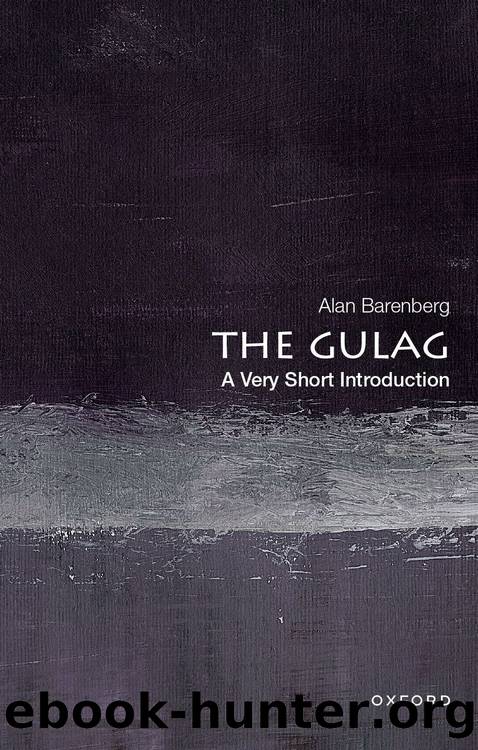The Gulag by Alan Barenberg

Author:Alan Barenberg [Barenberg, Alan]
Language: eng
Format: epub
ISBN: 9780197548240
Publisher: Oxford University Press
Published: 2023-12-07T00:00:00+00:00
Prisoners attempted to supplement their rations whenever possible. Many prisoners relied on food parcels sent from family to make up precious calories, or to provide them with goods to trade for bread and other essentials. Parcels could rarely be counted upon for a regular food supply given constantly changing regulations, theft by camp officials and fellow prisoners, as well as the changing food situation in Soviet society at large. But goods sent from home could make a significant difference for both physical condition and morale. A 1940 letter from prisoner S. K. Kuskov to his family outlines what was most highly valued in the camps: âfats, sugar, and especially tobacco.â He also asked for âonions, garlicâ¦and rolling papers.â Prisoners also frequently requested other goods such as clothing, blankets, newspapers, and books, both because of the usefulness of the items and also their value in trade. The campsâ informal economy provided other opportunities to supplement oneâs caloric intakeâperforming odd jobs for camp officials, guards, or fellow prisoners could net extra bread rations. One should note, however, that whatever a prisoner might gain through informal means had likely been siphoned off from the official camp food supply in the first place. The acquisition of food in the camps was a zero-sum game, and it contributed to conflict and violence among prisoners.
If obtaining more food was essential for survival, so was expending less energy on work. Gulag inmates endeavored to avoid manual labor at all costs, and if assigned such jobs, to work as little as possible. Manual labor, or âgeneral laborâ as it was called, often meant exposure to dangers such as extreme cold and unsafe working conditionsâbut it also meant expending precious energy, and therefore inmates sought to preserve the calories that they consumed by working as little as possible. Prisoners developed a variety of techniques to avoid such work and increase their chances of survival. A hospital stay could provide a reprieve from hard labor, and therefore many prisoners went through extraordinary lengths to be hospitalized. Dissimulation, whereby prisoners attempted to fake an illness or injure themselves to such a degree that they might gain a temporary or permanent reprieve from hard labor, was relatively common. By doing so, however, prisoners not only risked their health but also further punishment, as such acts were often characterized as sabotage and prosecuted accordingly.
Prisoners sought out jobs that were not dangerous or physically demanding, and also those that allowed better access to food and other scarce resources. Each camp required a substantial support and administrative staff engaged in operations such as planning, medical care, food preparation, and providing cultural activities for prisoners and nonprisoners. Not only were these generally low-effort, indoor jobs, but they often offered opportunities to secure extra resources, especially food. Such jobs literally saved the lives of prisoners. Arsenii Formakov, a Latvian writer who was held in Kraslag on the Yenisei River in Siberia, was hired as a weigher of bread rations in 1946, a job that led to an immediate improvement in his physical condition, since it gave him access to extra food.
Download
This site does not store any files on its server. We only index and link to content provided by other sites. Please contact the content providers to delete copyright contents if any and email us, we'll remove relevant links or contents immediately.
| Africa | Americas |
| Arctic & Antarctica | Asia |
| Australia & Oceania | Europe |
| Middle East | Russia |
| United States | World |
| Ancient Civilizations | Military |
| Historical Study & Educational Resources |
Red Famine: Stalin's War on Ukraine by Anne Applebaum(2799)
Chernobyl by Serhii Plokhy(2416)
Midnight in Chernobyl by Adam Higginbotham(2364)
The House of Government by Slezkine Yuri(2088)
Midnight in Chernobyl: The Untold Story of the World's Greatest Nuclear Disaster by Adam Higginbotham(2056)
Red Shambhala by Andrei Znamenski(2049)
The Gulag Archipelago (Vintage Classics) by Aleksandr Solzhenitsyn(1963)
All the Kremlin's Men by Mikhail Zygar(1947)
From Cold War to Hot Peace by Michael McFaul(1927)
Red Notice by Bill Browder(1903)
Putin's Labyrinth(1879)
The Future Is History by Masha Gessen(1810)
From Russia with Lunch by David Smiedt(1781)
A People's Tragedy by Orlando Figes(1751)
The Romanovs by Simon Sebag Montefiore(1707)
How to Tame a Fox (and Build a Dog): Visionary Scientists and a Siberian Tale of Jump-Started Evolution by Lee Alan Dugatkin & Lyudmila Trut(1658)
Putin's Labyrinth: Spies, Murder, and the Dark Heart of the New Russia(1651)
The Lost Spy by Andrew Meier(1613)
Art and Revolution by John Berger(1591)
